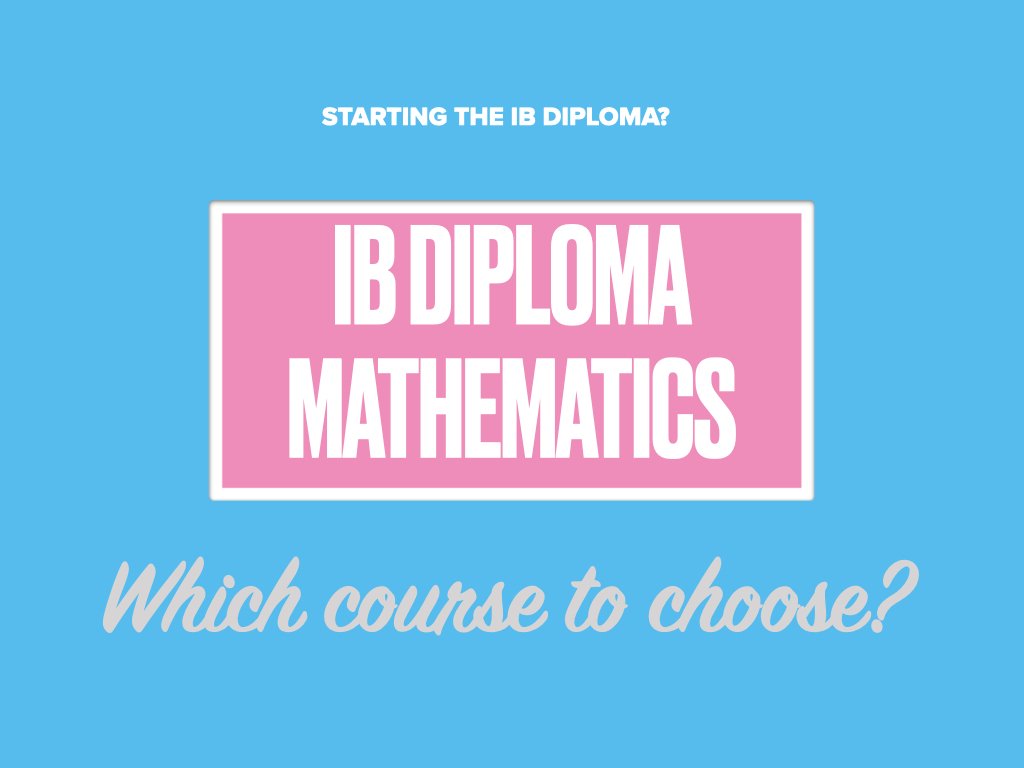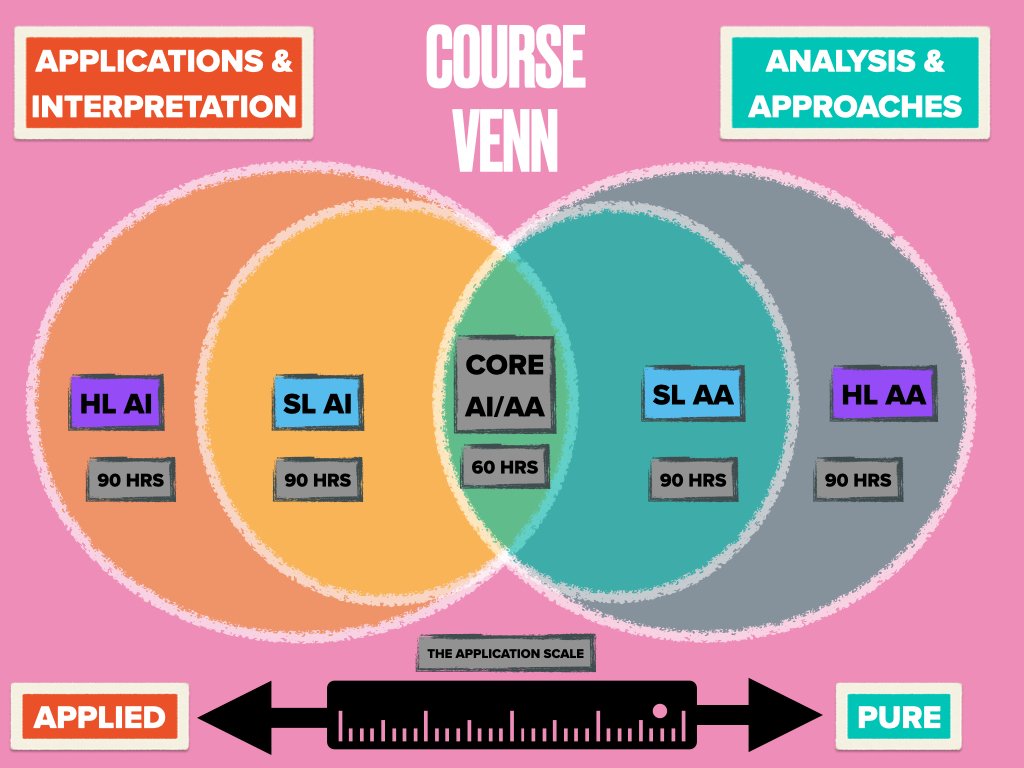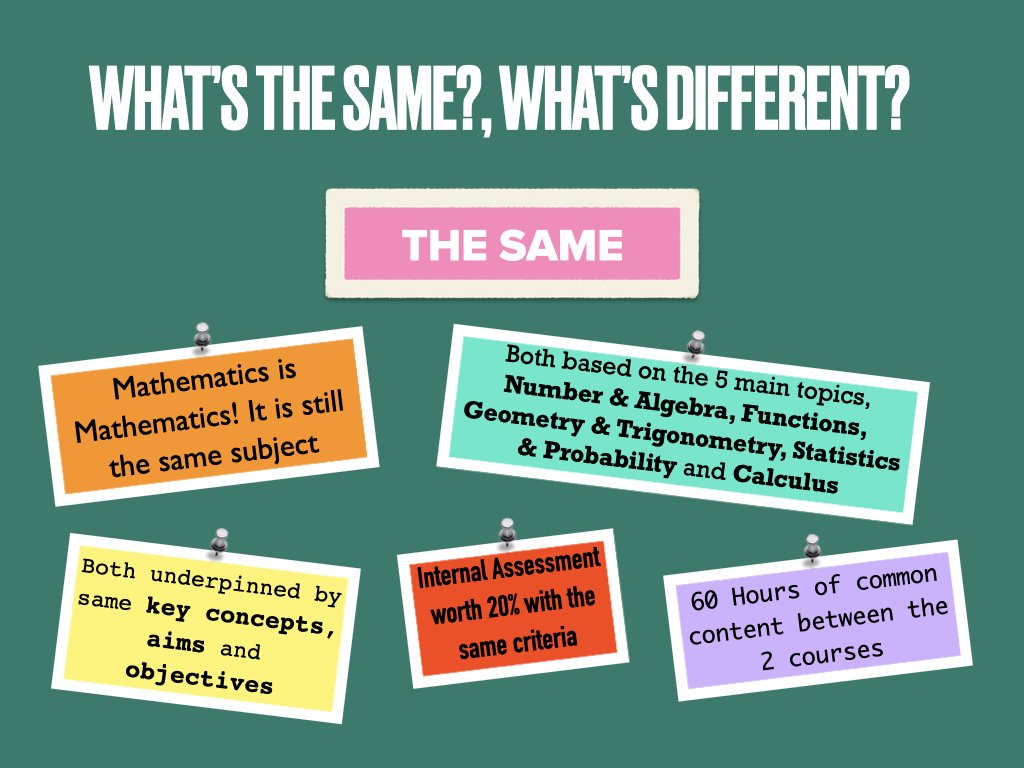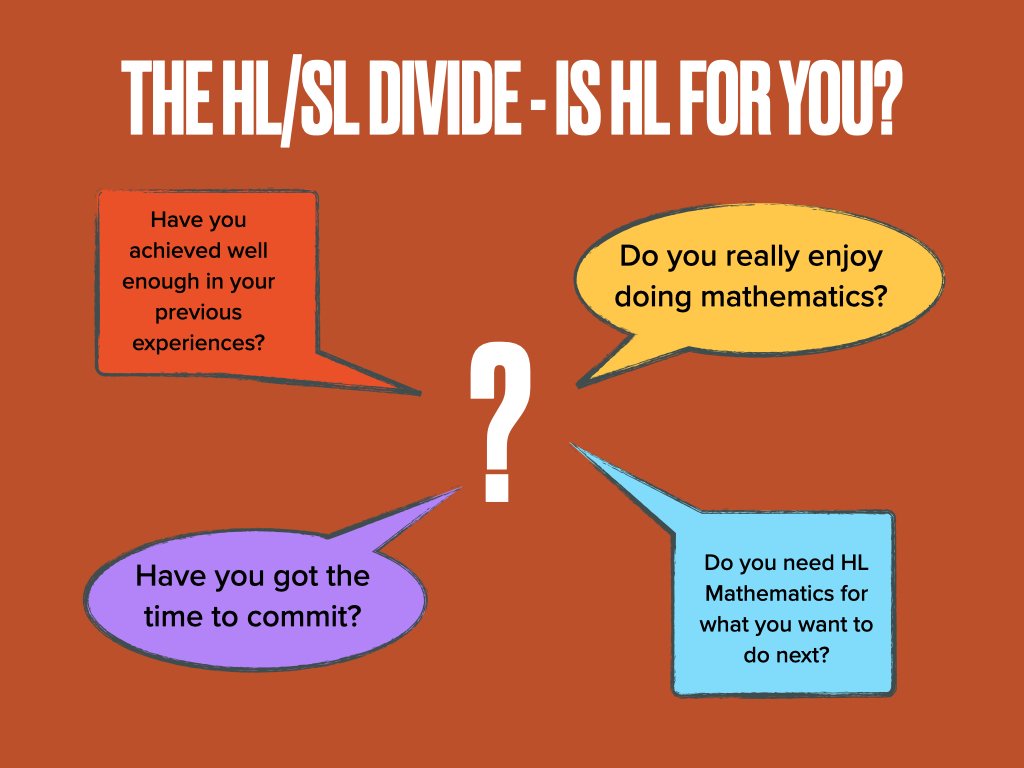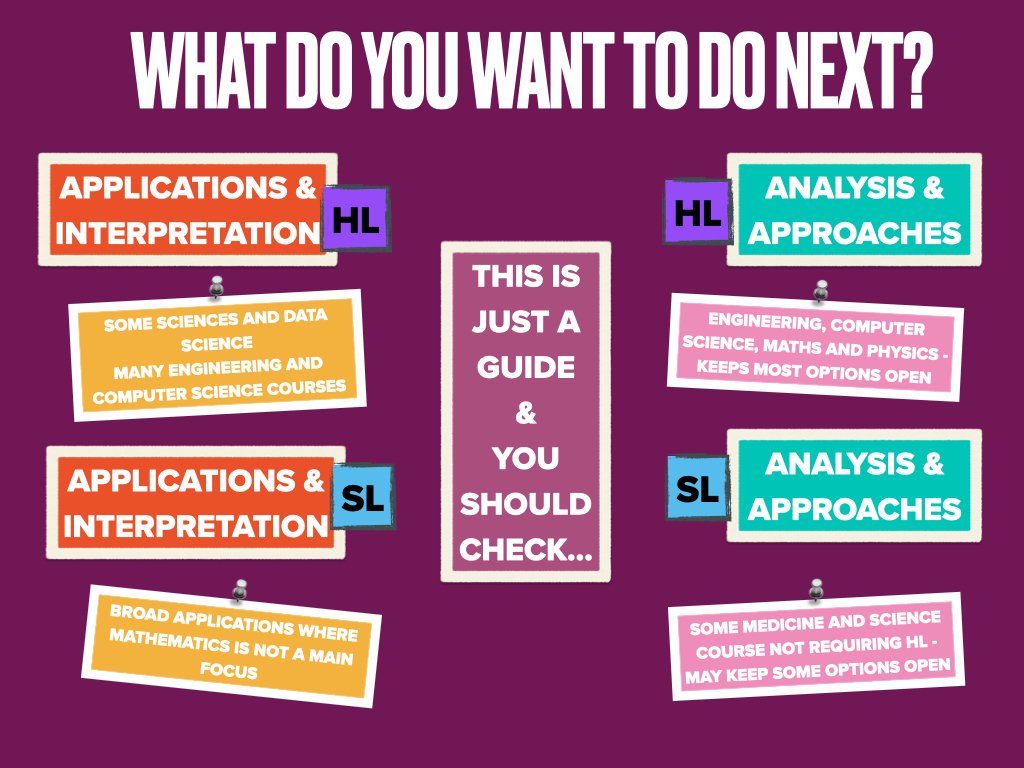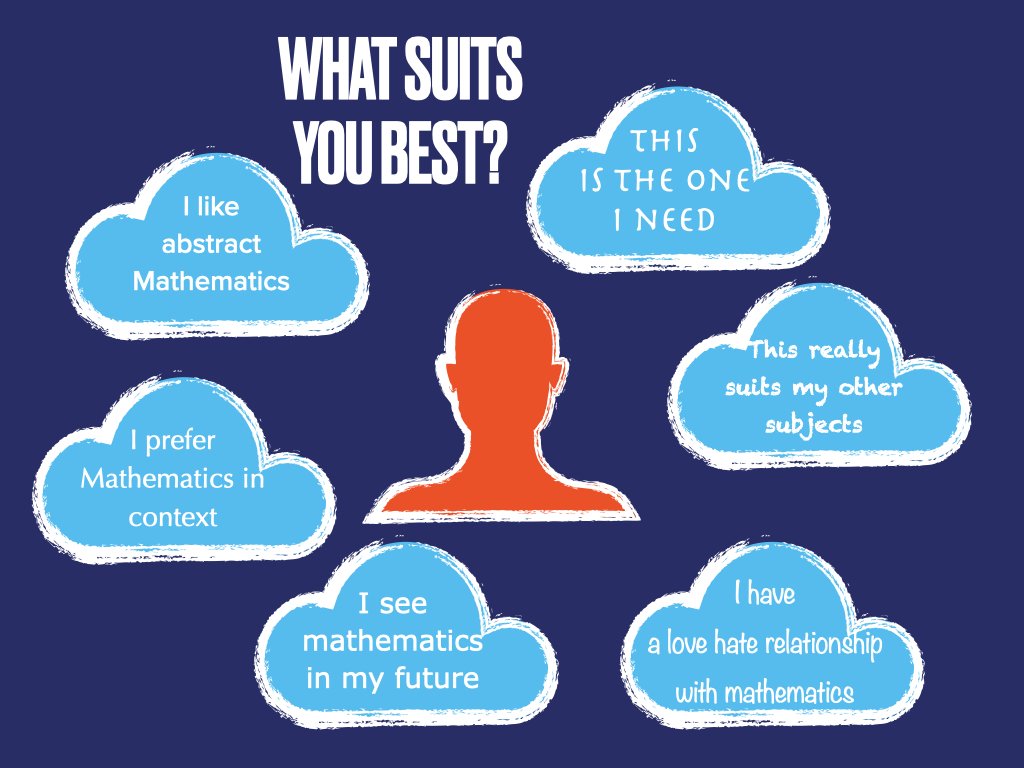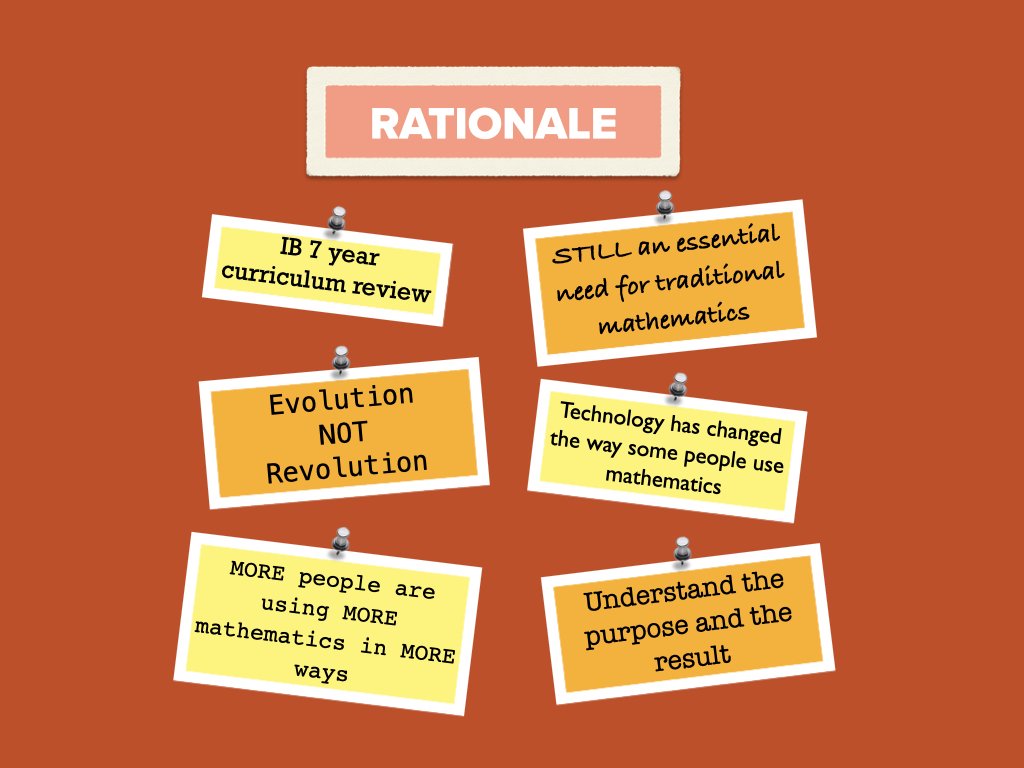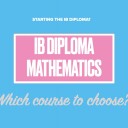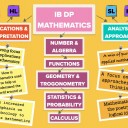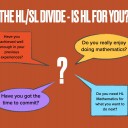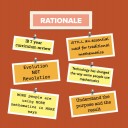Which mathematics course?
 Choosing the right mathematics course for you
Choosing the right mathematics course for you
This page is designed for students and parents who are about to start or have just started the diploma program want to find out about the choices and the courses in detail so they can make an informed decision. It is all about what your preferences are, where your strengths lie, what other subjects you are taking and, most importantly, what are you thinking about doing next? The main point to take though is that both of these courses a packed full of interesting, engaging and deeply relevant ideas and both will provide a good deal of challenge!
A presentation
Below is a slideshow to help cover the key points in understanding the choice at hand and below that is a video presentation of that slideshow. A written elaboration of all those key points follows after that.
The following offers you a really quick overview to start with. More details follow below, but it is always good to get some basics out of the way first. Here are two key choices you have to make. You might already know the answer and they obviously don't have to be made in this order, but for the sake of clarity....
- Your first choice is between the two courses offered, Mathematics: Applications and Interpretation OR Mathematics Analysis and Approaches.
- Your second choice is to decide if you want to study the course at HL (Higher level) or SL (Standard level). In case you don't know, to study for the IB diploma you will take 6 subjects and 3 of them have to be at HL and 3 at SL. It is rare and generally ill advised to take more than 3 HL subjects. It generally only happens early on where students are undecided so they can change their minds at a later date.
The diagram below offers a summary view of the 2 courses. For better or worse the courses are often abbreviated to to Math(s) Apps and Math(s) Analysis or Math(s) AI and Math(s) AA

What do the courses have in common?
- Its all mathematics - it is not as though some new version of mathematics has been invented that looks completely different!
- Both Syllabi are underpinned by the same core concepts, aims and objectives.
- Both Syllabi are built around the same 5 topics, Number & Algebra, Functions, Geometry & Trigonometry, Statistics & Probability and Calculus.
- There are 60 hours of common content in the SL part of the course that is common to both AI and AA
- The Internal Assessment element of both courses is worth 20% and marked against exactly the same criteria. (Although the mathematics used may be different)
- In both courses the SL is assessed externally with 2 exam papers and the HL with 3.
What are the key differences?
- The AI course has a strong focus on applications of mathematics and how mathematics is used to describe, understand and develop the world around us. There will be elements of pure mathematics as well, but the emphasis is more on the applications.
- The AA course is a mix of both pure and applied mathematics with a strong focus on a more abstract line of mathematical reasoning and the logic of processes and methods.
- Whilst there is the core 60 hours and the 5 topics are the same, the specific foci of the syllabi varies within that to reflect the differences listed in the two bullet points above
- Both courses will make a lot of use of technology, BUT it is worth noting that on the AI course, you are ALWAYS allowed the use of a Graphical Display Calculator (GDC) and on the AA course a significant amount of the assessment is done without a calculator (40% at SL and 30% at HL)
This is a very important question to ask. All the subject groups are slightly different in nature and mathematics tends to stand out more than some of the others. The HL/SL divide is also a bit different. For some subjects the difference between HL and SL is not hugely signficant and for others is largely a case of just 'more material' and not necessarily harder. For both mathematics courses it is both 'more material' and 'harder' and you need to know this from the off. The HL elements of both courses will challenge you with more sophisticate ideas and more difficult questions. Teachers and past students of IB mathematics will all testify that the difference is significant. That is not designed to put people off - quite the opposite, the rigour and challenge of an HL mathematics qualification has a great reputation for exactly those reasons. Here are some ponts for you to consider...
- Do you know, and can your current teachers confirm, that the level of mathematics you have attained so far is good enough to take on one of the HL courses?
- If there is any uncertainty about the above, then do you accept that you will probably have to put ion a good deal of extra time and seek extra support to make up the difference?
- In either of the above cases, do you enjoy Mathematics! It is a really hard slog if you don't,
- If HL mathematics doesn't work out for you, do you have a fall back plan? (have you got another subject you have been doing at HL or can switch to, to make sure you have your 3 HLs?)
I'm sure that teachers everywhere can tell you about students who have blossomed at IB and really worked hard to develop in to excellent mathematicians when they may not have shown this before. This happens and its wonderful when it does. As a result, we are always open to the possibility and will support it. It has to be tempered with the experience we have have of students who started with great intention and ambition and even those that work really hard, still found that HL was too much to do alongside all the other demands of the IB.
This is often a tough question and it is, of course, perfectly fine not to know. You have to ask the question though and use what you do know about your plans to try and help. It is also important to say that whilst there are some obvious trends and patterns developing, there is no substitute for knowing from a specific University course what their requirements are. If websites don't say, an e-mail to the admissions department will get an answer pretty quickly. Certain universities in certain countries impose rules that may not always be obvious. The following is a quick guide...
- Applications HL - Suitable for sciences (except “some” physics courses) and data sciences. For many engineering and computer science courses this course is also accepted.
- Applications SL - A broad applied mathematics course that covers the ways in which maths is likely to be used in all further studies where maths is not an integral focus.
- Analysis HL - For Engineering, computer science, maths and physics, HL Analysis keeps the most options open.
- Analysis SL - For some medicine and sciences (that do not require HL) and for some other university courses, SL Analysis may keep the most options open. (we recommend checking)
It is important to think about yourself, the strengths and weaknesses, your preferences and your other choices..
- Are you more likely to be involved with purer mathematics or more applied mathematics in the future?
- Will you need this qualification or level to go on to study what you want to study?
- Have you got confirmation of this from universities?
- Does this fit with what is in your school's IB handbook?
- Which course best fits the kind of mathematics you think you like to do? This is difficult though because the increased focus on applied mathematics is quite different from your previous experiences and, as such, a little unknown.
- Maybe you have always enjoyed abstract problem solving and/or sometimes found that contexts just make it more difficult (They do sometimes you know!)
- Maybe you have only really enjoyed mathematics when you can see how it is relevant to real contexts in the world around you.
- Experienced teachers have found that students who's experience of maths has been tough generally enjoy more and do better with the Applications SL course as it may offer a new opportunitity to look at mathematics in a fresh light.
- Which mathematics course best fits your other subject choices? This can make a big difference to your working day.
Some good combinations...
- Computer Science and Maths Analysis go well together
- HL Physics and HL Maths (both) are a good combination
- Human sciences (Sometimes referred to as soft sciences - humanities, pyschology, sociology, etc) will go better with Math Applications
- Of the natural sciences, Biology might fit better with Applications and chemistry maybe better with analysis
NOTE - these are not rules and may not always be true - these are just observations and patterns from experience designed to help you consider - nothing more.
It is quite common for people to want to know a little more about the thinking behind this choice. Whilst mathematics remains mathematics, new technologies have facilitated the application of mathematics to more and more fields. They have made it easier and more common. As such, there is a view that the range of mathematical skills required is broader that it has been before. The technology also allows for the possibility that some people can focus on understanding the purpose of mathematical tools so they can choose them wisely and understand the results while technology processes. Along with that, Mathematics is a huge subject and school mathematics has only ever been able to include so much of it.
The IB has a robust process of curriculum review which resuts in changes/updates once every seven years. The process is informed by expertise and by the market and carried out by a combination of that expertise and classroom teachers. Oliver Bowles and Jim Noble, were both lucky enough to have been involved with the last review which was probably one of the biggest!
The review panel took the opportunity to recognise the changes mentioned in the paragraph above and create what we can consider a 'new' course. The analysis and approaches course has been updated to reflect changes, but remains what we might refer to as the more 'traditional' mathematics course, focussing on core mathematical ideas and thinking that is essential for the continued development and application of mathematics. The applications and interpretation course can be seen as 'new' in that it brings a 'new' focus to school mathematics where the the applied purpose of the mathematics in the world around us is at the focus. There is a greater emphasis on the idea that technology can do a lot of the mathematics for us and we are free to focus on understanding the purpose and results of mathematical investigation.
Conrad Wolfram and the computer based mathematics organisation has been one of the key drivers of this change. Although the view might be seen by some as a little extreme, it is good for understanding some of the shift in emphasis.
In short, we see the new offerings as an evolution rather than a revolution. We value all elements of mathematics education and welcome both the possibility to keep traditional roots and to branch out in to new territory for students in recognition of the evolving way in which mathematics is being applied! We are delighted for students that they now have this choice, although we know that some will find it a difficult one to make.
...

